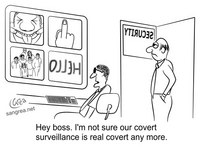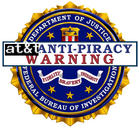
by Diana Walker |
Chances are that as you read this article, it is passing over part of AT&T’s network. That matters, because last week AT&T announced that it is seriously considering plans to examine all the traffic it carries for potential violations of U.S. intellectual property laws. The prospect of AT&T, already accused of spying on our telephone calls, now scanning every e-mail and download for outlawed content is way too totalitarian for my tastes. But the bizarre twist is that the proposal is such a bad idea that it would be not just a disservice to the public but probably a disaster for AT&T itself. If I were a shareholder, I’d want to know one thing: Has AT&T, after 122 years in business, simply lost its mind?Come now; what did you think they were up to? Continue readingNo one knows exactly what AT&T is proposing to build. But if the company means what it says, we’re looking at the beginnings of a private police state. That may sound like hyperbole, but what else do you call a system designed to monitor millions of people’s Internet consumption? That’s not just Orwellian; that’s Orwell.
— Has AT&T Lost Its Mind?A baffling proposal to filter the Internet. By Tim Wu, Slate, Posted Wednesday, Jan. 16, 2008, at 10:15 AM ET






